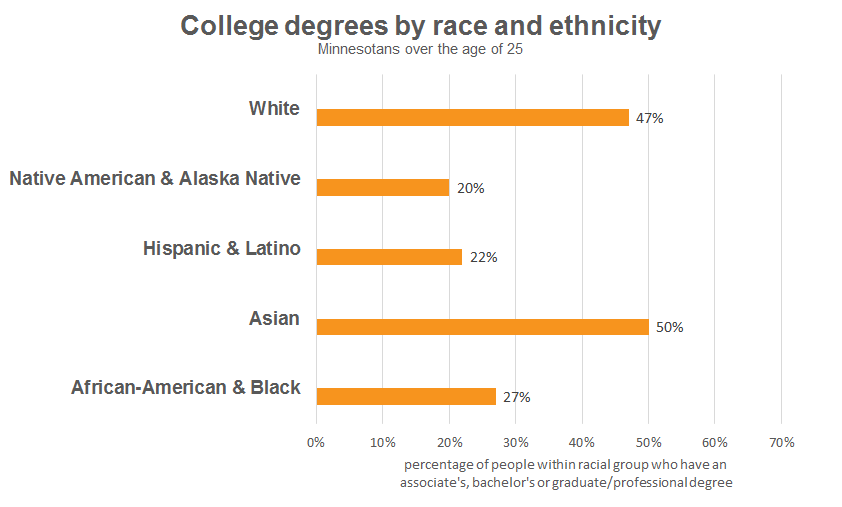Data show blacks struggling in MN, but picture incomplete
Go Deeper.
Create an account or log in to save stories.
Like this?
Thanks for liking this story! We have added it to a list of your favorite stories.
New Census data show black Minnesotans worse off economically in 2014 than they were the year before. But the numbers don't tell the whole story.
There's no doubt the basics from the most recent American Community Survey paint a grim picture of the social and financial condition of many African-Americans in Minnesota compared to whites. While concerns about discrimination and economic opportunities are real, those who work with the data still caution against drawing hard conclusions about the future based on the numbers. Here's why.
Demographics
Turn Up Your Support
MPR News helps you turn down the noise and build shared understanding. Turn up your support for this public resource and keep trusted journalism accessible to all.
The population counted as black changes rapidly. About 9,000 blacks moved out of Minnesota, but in-migration resulted in 16,000 blacks moving into the state between 2013 and 2014. Data also show the population of foreign-born blacks with limited English skills increased by an estimated 14,000 in that same period.

"To me it shows not that his group is faring worse than they were in the year prior, but that something is going on in this group, changes that we are seeing unfold, with each data set that we get," said Minnesota State Demographer Susan Brower. "Who's here, who's working, who left -- all of these things can impact that one high level summary number," she added. "We just need to be really careful about interpreting year to year changes."
Education
Historically, black Minnesotans are less likely to have college degrees than other populations.
With Minnesota black poverty rate high and almost unchanged at about 37 percent for decades, it's likely many students have struggled financially to finish a four-year degree. Ultimately that affects incomes, housing and employment.
But that problem isn't set in stone. Public policy may have a role to play. Leaders of the NAACP chapters in Minnesota and the Dakotas met recently with Gov. Mark Dayton to discuss equity in the workforce, education and housing. Nekima Levy-Pounds, president of the Minneapolis chapter, says blacks are moving to Minnesota because the quality of life is good overall.

"They want to tap into those opportunities. They want to be able to get jobs. They're here seeking opportunity," she says. "The sad part is that we are not welcoming to outsiders" in Minnesota, "especially African-American outsiders. They face so much discrimination...help them to find their place...there's room for everybody here."
Small business
Small businesses can be wealth creators and new research shows positives signs for Minnesota minority-owned small business. University of Minnesota economist Sam Myers and Concordia University St. Paul economist Bruce Corrie found reasons for optimism when they examined three-year data from the Census Bureau's Survey of Business Owners.
"These minority firms are growing faster in sales, in number of firms, in payroll, and in job creation than non-minority firms," said Corrie.
"Their firms are major job creators ... and growing at a faster rate than non-minority firms," he added. "Something good is happening in that entrepreneur area that needs to be nurtured because that's also going to be the solution to these declining economic assets."
Listen to the audio to hear more about the latest economic data and how citizens and experts see it.


